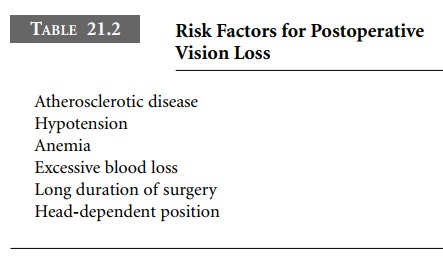Chapter: Clinical Cases in Anesthesia : Spine Surgery
Is this patient at risk for postoperative vision loss?
Is this patient at risk for postoperative vision loss?
Several techniques have been employed to reduce
blood loss and limit the need for homologous transfusions: posi-tioning that
reduces intra-abdominal pressure; surgical hemostasis; deliberate controlled
hypotensive anesthesia; reinfusion of salvaged blood; normovolemic
hemodilution. A devastating complication of these procedures is the development
of ischemic optic neuropathy (ION). This has been reported with increasing
frequency over the last decade. Postoperative vision loss is most often due to
ante-rior or posterior ischemic optic neuropathy (AION, PION) and rarely due to
less common perioperative complications such as central retinal artery or vein
occlusion and occipi-tal lobe infarcts. Causes of ION include:
·
decreased
perfusion pressure due to systemic hypoten-sion, increased venous pressure, or
large vessel occlusive disease
·
increased
resistance to blood flow due to increased blood viscosity, local arterial
disease, or increased external pressure
·
decreased
oxygen carrying capacity.
There are no identified effective treatments
for ION and the vision loss is most often permanent. Prolonged surgery, large
intraoperative blood loss, and large-volume fluid replacement have been
reported to be associated with increased risk of ION. Patient risks are also
noted in Table 21.2.

Maintenance of spinal cord perfusion is essential and must be maintained. Multiple-level surgery and fusion requires strict attention to replacement of intraoperative fluid losses and careful assessment before extubation of the trachea. This patient is relatively healthy but should be warned preoperatively of this potential complication.
Related Topics